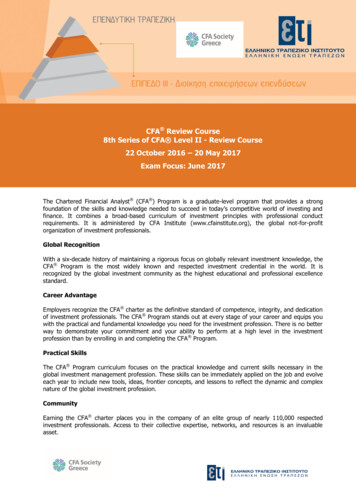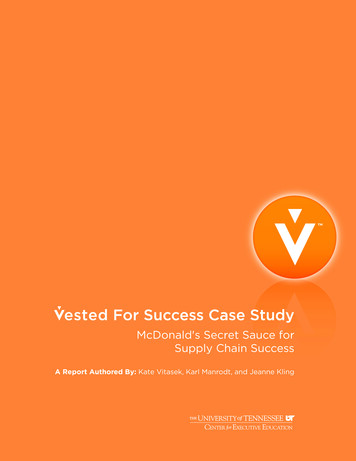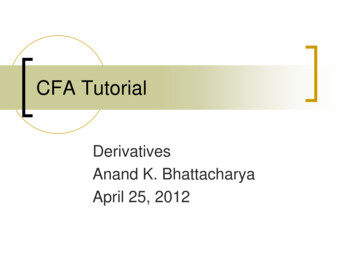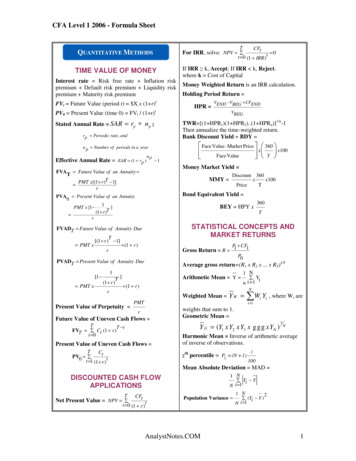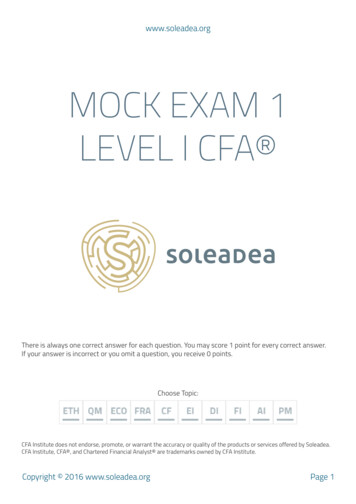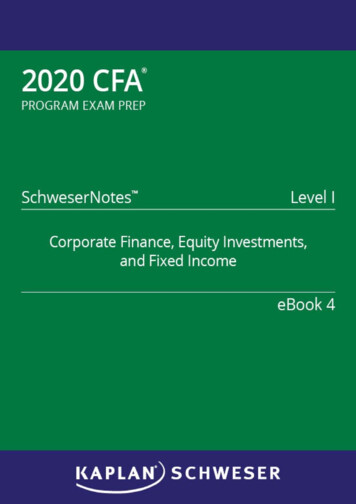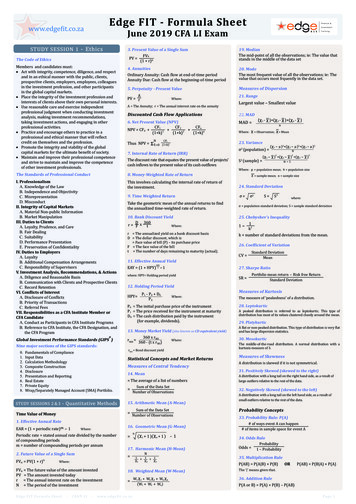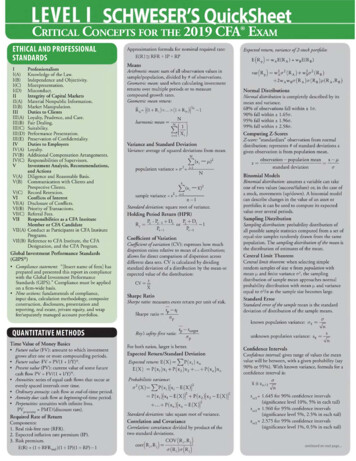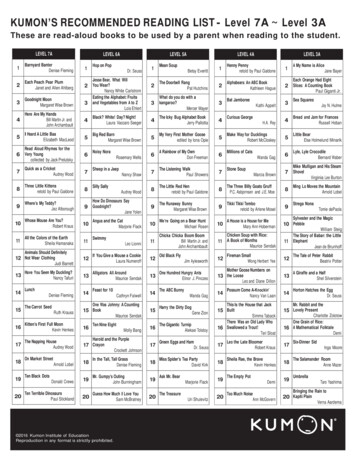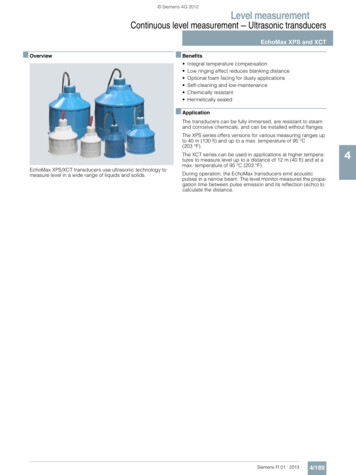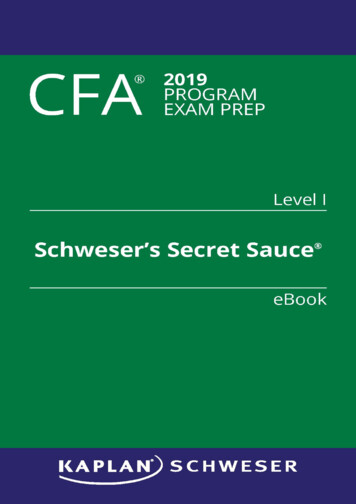
Transcription
cal and Professional Standards: SS 1Quantitative Methods: SS 2 & 3Economics: SS 4 & 5Financial Reporting and Analysis: SS 6, 7, 8, & 9Corporate Finance: SS 10 & 11Portfolio Management: SS 12 & 13Equity Investments: SS 14 & 15Fixed Income: SS 16 & 17Derivatives: SS 18Alternative Investments: SS 19Essential Exam StrategiesCopyright
FOREWORDThis book will be a valuable addition to the study tools of any CFA exam candidate. Itoffers a very concise and very readable explanation of the major parts of the Level ICFA curriculum. Here is the disclaimer: this book does not cover every LearningOutcome Statement (LOS) and, as you are aware, any LOS is “fair game” for the exam.We have tried to include those LOS that are key concepts in finance and accounting,have application to other LOS, are complex and difficult for candidates, requirememorization of characteristics or relationships, or are a prelude to LOS at Levels IIand III.We suggest you use this book as a companion to your other, more comprehensive studymaterials. It is easier to carry with you and will allow you to study these key concepts,definitions, and techniques over and over, which is an important part of mastering thematerial. When you get to topics where the coverage here appears too brief or raisesquestions in your mind, this is your clue to go back to your SchweserNotes or thetextbooks to fill in the gaps in your understanding. For the great majority of you, thereis no shortcut to learning the very broad array of subjects covered by the Level Icurriculum, but this volume should be a very valuable tool for learning and reviewingthe material as you progress in your studies over the months leading up to exam day.Pass rates have recently been between 35% and 45%, and returning Level I candidatesmake comments such as, “I was surprised at how difficult the exam was.” You shouldnot despair because of this, but you should definitely not underestimate the task at hand.Our study materials, practice exams, question bank, videos, seminars, and Secret Sauceare all designed to help you study as efficiently as possible, help you to grasp and retainthe material, and apply it with confidence come exam day.Best regards,Doug Van EatonCraig S. ProchaskaDr. Doug Van Eaton, CFA SVP and LevelI ManagerCraig S. Prochaska, CFA Senior ContentSpecialistKaplan SchweserKaplan Schweser
ETHICAL AND PROFESSIONALSTANDARDSStudy Session 1Weight on Exam15%SchweserNotes Reference.Book 1, Pages 1–63Ethics is 15% of the Level I examination and is extremely important to your overallsuccess (remember, you can fail a topic area and still pass the exam, but we wouldn’trecommend failing Ethics). Ethics can be tricky, and small details can be important onsome ethics questions. Be prepared.In addition to starting early, study the ethics material more than once. Ethics is one ofthe keys to passing the exam.ETHICS AND TRUST IN THE INVESTMENT PROFESSIONCross-Reference to CFA Institute Assigned Reading #1Ethics can be described as a set of shared beliefs about what behavior is good oracceptable.Ethical conduct has been described as behavior that follows moral principles and isconsistent with society’s ethical expectations and also as conduct that improvesoutcomes for stakeholders, those who are directly or indirectly affected by the conduct.A code of ethics is a written set of moral principles that can guide behavior.Having a code of ethics is a way to communicate an organization’s values,principles, and expectations.Some codes of ethics include a set of rules or standards that require someminimum level of ethical behavior.A profession refers to a group of people with specialized skills and knowledgewho serve others and agree to behave in accordance with a code of ethics.One challenge to ethical behavior is that individuals tend to overrate the ethical qualityof their behavior and overemphasize the importance of their personal traits indetermining the ethical quality of their behavior.It is claimed that external or situational influences, such as social pressure from othersor the prospect of acquiring more money or greater prestige, have a greater effect on theethical quality of behavior than personal traits.Investment professionals have a special responsibility because they are entrusted withtheir clients’ wealth. Because investment advice and management are intangible
products, making quality and value received more difficult to evaluate than for tangibleproducts, trust in investment professionals takes on an even greater importance. Failureto act in a highly ethical manner can damage not only client wealth but also impede thesuccess of investment firms and investment professionals because potential investorswill be less likely to use their services.Unethical behavior by financial services professionals can have negative effects forsociety as a whole. A lack of trust in financial advisors will reduce the funds entrustedto them and increase the cost of raising capital for business investment and growth.Unethical behavior such as providing incomplete, misleading, or false information toinvestors can affect the allocation of the capital that is raised.Ethical vs. Legal StandardsNot all unethical actions are illegal, and not all illegal actions are unethical. Acts of“whistleblowing” or civil disobedience that may be illegal in some places areconsidered by many to be ethical behavior. On the other hand, recommendinginvestment in a relative’s firm without disclosure may not be illegal, but would beconsidered unethical by many. Ethical principles often set a higher standard of behaviorthan laws and regulations. In general, ethical decisions require more judgment andconsideration of the impact of behavior on many stakeholders compared to legaldecisions.Framework for Ethical Decision MakingEthical decisions will be improved when ethics are integrated into a firm’s decisionmaking process. The following ethical decision-making framework is presented in theLevel I CFA curriculum:1Identify: Relevant facts, stakeholders and duties owed, ethical principles, conflictsof interest.Consider: Situational influences, additional guidance, alternative actions.Decide and act.Reflect: Was the outcome as anticipated? Why or why not?STANDARDS OF PRACTICE HANDBOOKCross-Reference to CFA Institute Assigned Readings #2 & 3We recommend you read the original Standards of Practice Handbook. Although weare very proud of our reviews of the ethics material, there are two reasons werecommend you read the original Standards of Practice Handbook (11th Ed., 2014). (1)You are a CFA candidate. As such, you have pledged to abide by the CFA Institute Standards. (2) Most of the ethics questions will likely come directly from the text andexamples in the Standards of Practice Handbook. You will be much better off if youread both our summaries of the Standards and the original Handbook and all theexamples presented in it.
The CFA Institute Professional Conduct Program is covered by the CFA InstituteBylaws and the Rules of Procedure for Proceedings Related to Professional Conduct.The Disciplinary Review Committee of the CFA Institute Board of Governors hasoverall responsibility for the Professional Conduct Program and enforcement of theCode and Standards.CFA Institute, through the Professional Conduct staff, conducts inquiries related toprofessional conduct. Several circumstances can prompt such an inquiry:Self-disclosure by members or candidates on their annual Professional ConductStatements of involvement in civil litigation or a criminal investigation, or that themember or candidate is the subject of a written complaint.Written complaints about a member or candidate’s professional conduct that arereceived by the Professional Conduct staff.Evidence of misconduct by a member or candidate that the Professional Conductstaff received through public sources, such as a media article or broadcast.A report by a CFA exam proctor of a possible violation during the examination.Analysis of exam scores and materials and monitoring of websites and socialmedia by CFA Institute.Once an inquiry is begun, the Professional Conduct staff may request (in writing) anexplanation from the subject member or candidate, and may:Interview the subject member or candidate.Interview the complainant or other third parties.Collect documents and records relevant to the investigation.The Professional Conduct staff may decide:That no disciplinary sanctions are appropriate.To issue a cautionary letter.To discipline the member or candidate.In a case where the Professional Conduct staff finds a violation has occurred andproposes a disciplinary sanction, the member or candidate may accept or reject thesanction. If the member or candidate chooses to reject the sanction, the matter will bereferred to a panel of CFA Institute members for a hearing. Sanctions imposed mayinclude condemnation by the member’s peers or suspension of the candidate’scontinued participation in the CFA Program.Code and StandardsQuestions about the Code and Standards will most likely be application questions. Youwill be given a situation and be asked to identify whether or not a violation occurs, whatthe violation is, or what the appropriate course of action should be. You are not requiredto know the Standards by number, just by name.One of the first Learning Outcome Statements (LOS) in the Level I curriculum is tostate the six components of the Code of Ethics. Candidates should memorize the Codeof Ethics.
Members of the CFA Institute [including Chartered Financial Analyst (CFA )charterholders] and candidates for the CFA designation (Members and Candidates)must:Act with integrity, competence, diligence, and respect and in an ethical mannerwith the public, clients, prospective clients, employers, employees, colleagues inthe investment profession, and other participants in the global capital markets.Place the integrity of the investment profession and the interests of clients abovetheir own personal interests.Use reasonable care and exercise indepenident, professional judgment whenconducting investment analysis, making investment recommendations, takinginvestment actions, and engaging in other professional activities.Practice and encourage others to practice in a professional and ethical manner thatwill reflect credit on themselves and the profession.Promote the integrity and viability of the global capital markets for the ultimatebenefit of society.Maintain and improve their professional competence and strive to maintain andimprove the competence of other investment professionals.STANDARDS OF PROFESSIONAL CONDUCTThe following is a list of the Standards of Professional Conduct. Candidates shouldfocus on the purpose of the Standard, applications of the Standard, and properprocedures of compliance for each Standard.The following is intended to offer a useful summary of the current Standards ofPractice, but certainly does not take the place of careful reading of the Standardsthemselves, the guidance for implementing the Standards, and the examples in theHandbook.1. Know the law relevant to your position.Comply with the most strict law or Standard that applies to you.Don’t solicit gifts.Don’t compromise your objectivity or independence.Use reasonable care.Don’t lie, cheat, or steal.Don’t continue association with others who are breaking laws, rules, orregulations.Don’t use others’ work or ideas without attribution.Don’t guarantee investment results or say that past results will be certainlyrepeated.Don’t do things outside of work that reflect poorly on your integrity orprofessional competence.2. Do not act or cause others to act on material nonpublic information.
Do not manipulate market prices or trading volume with the intent tomislead others.3. Act solely for the benefit of your client and know to whom a fiduciary duty isowed with regard to trust accounts and retirement accounts.Treat clients fairly by attempting simultaneous dissemination of investmentrecommendations and changes.Do not personally take shares in oversubscribed IPOs.When in an advisory relationship:Know your client.Make suitable recommendations/take suitable investment action (in a totalportfolio context).Preserve confidential client information unless it concerns illegal activity.Do not try to mislead with performance presentation.Vote nontrivial proxies in clients’ best interests.4. Act for the benefit of your employer.Do not harm your employer.Obtain written permission to compete with your employer or to acceptadditional compensation from clients contingent on future performance.Disclose (to employer) any gifts from clients.Don’t take material with you when you leave employment (you can takewhat is in your brain).Supervisors must take action to both prevent and detect violations.Don’t take supervisory responsibility if you believe procedures areinadequate.5. Thoroughly analyze investments.Have reasonable basis.Keep records.Tell clients about investment process, including its risks and limitations.Distinguish between facts and opinions.Review the quality of third-party research and the services of externaladvisers.In quantitative models, consider what happens when their inputs are outsidethe normal range.6. Disclose potential conflicts of interest (let others judge the effects of any conflictfor themselves).Disclose referral arrangements.Client transactions come before employer transactions which come beforepersonal transactions.Treat clients who are family members just like any client.
7. Don’t cheat on any exams (or help others to).Don’t reveal CFA exam questions or disclose what topics were tested or nottested.Don’t use your Society position or any CFA Institute position orresponsibility to improperly further your personal or professional goals.Don’t use the CFA designation improperly.Don’t put CFA in bold or bigger font than your name.Don’t put CFA in a pseudonym that conceals
Our study materials, practice exams, question bank, videos, seminars, and Secret Sauce are all designed to help you study as efficiently as possible, help you to grasp and retain the material, and apply it with confidence come exam day. Best regards, Doug Van Eaton Craig S. Prochaska Dr. Doug Van Eaton, CFA SVP and Level I Manager Kaplan Schweser
